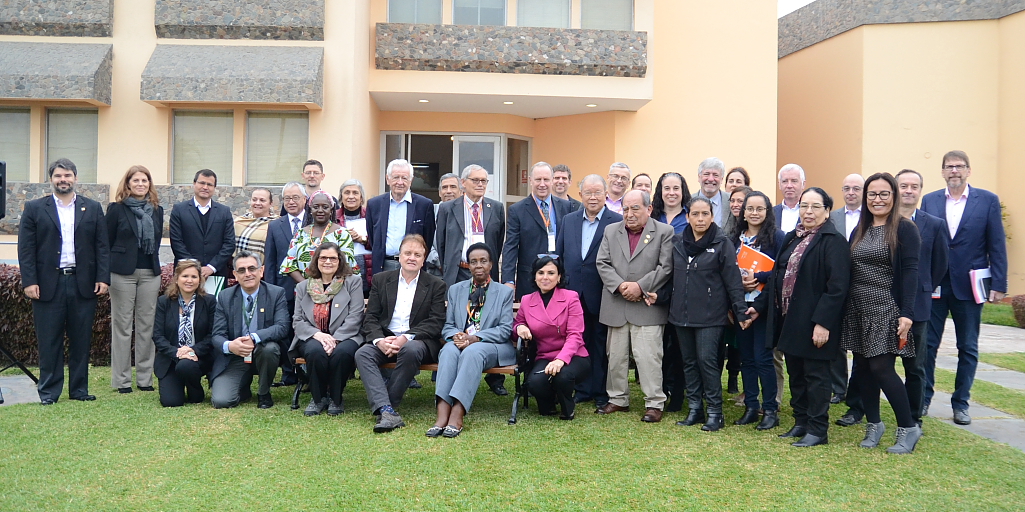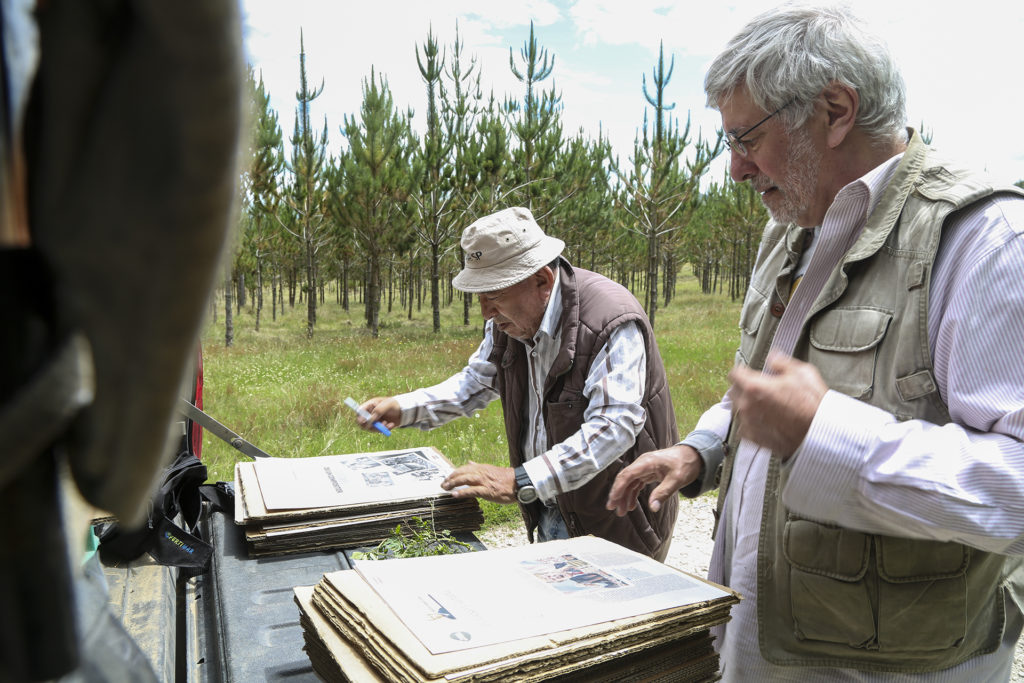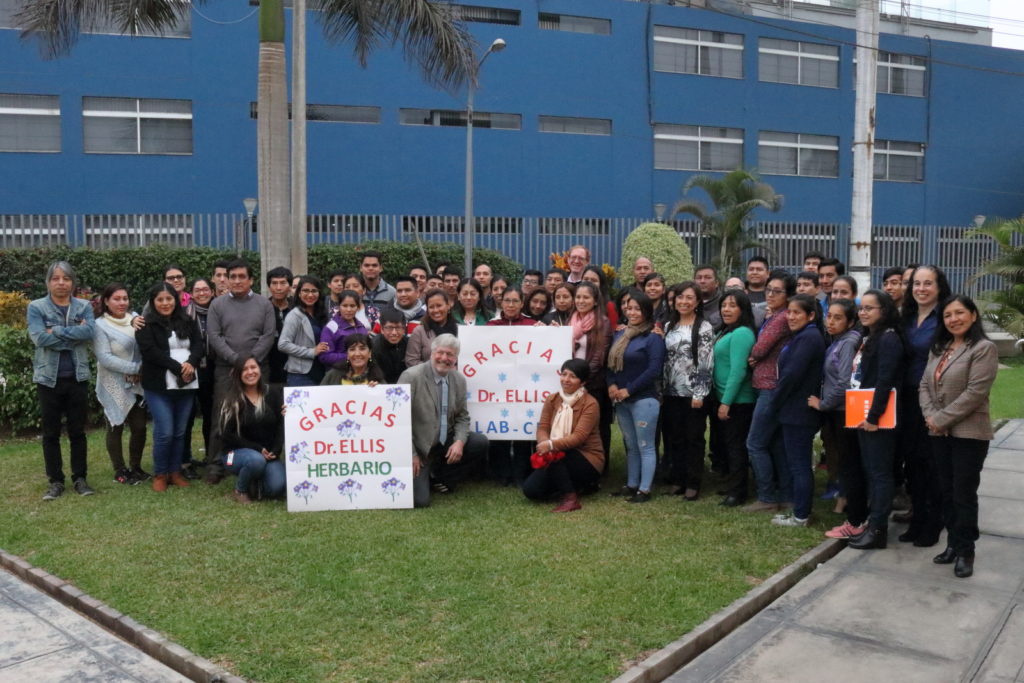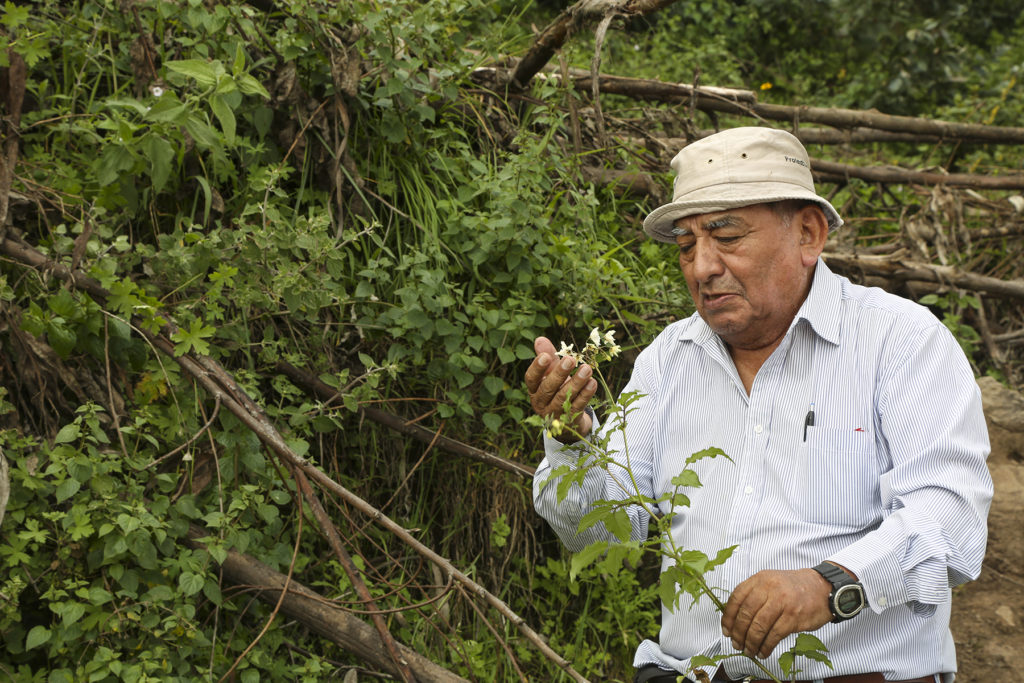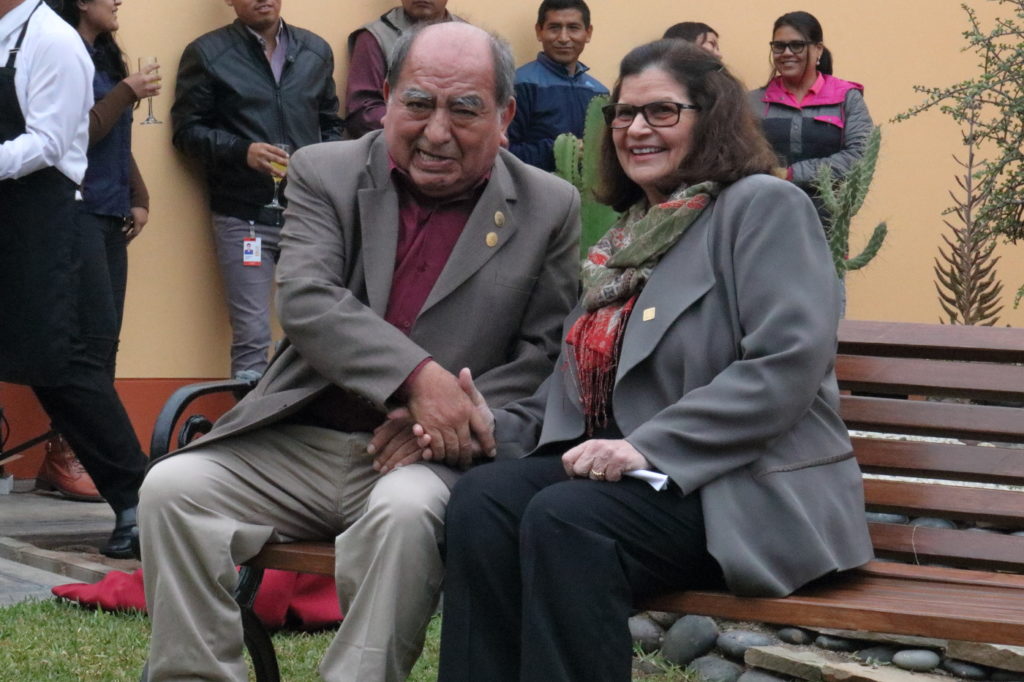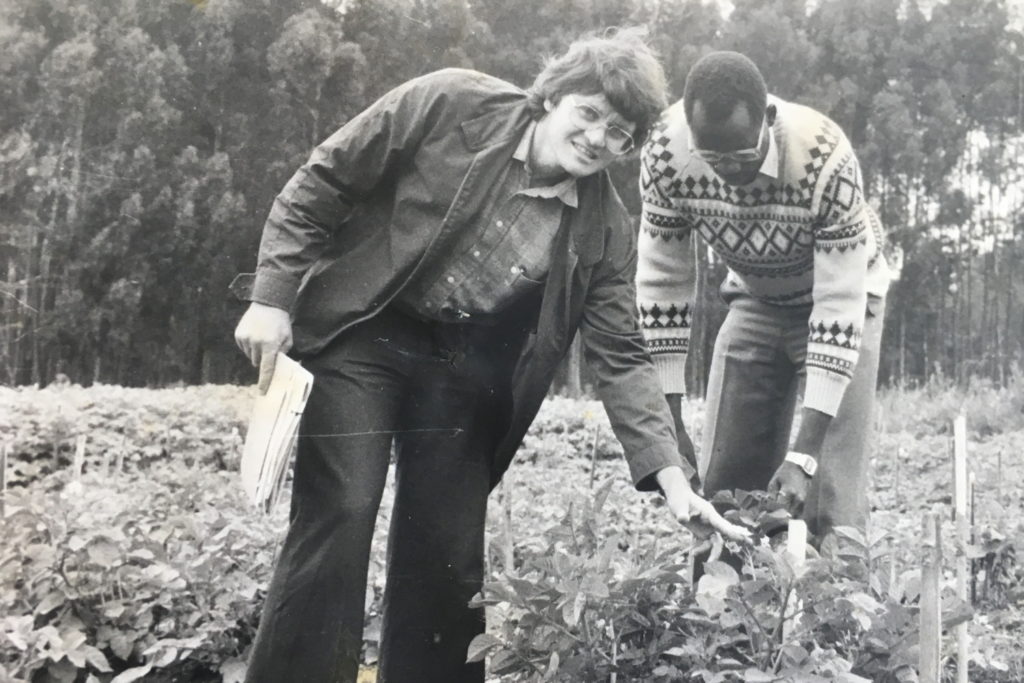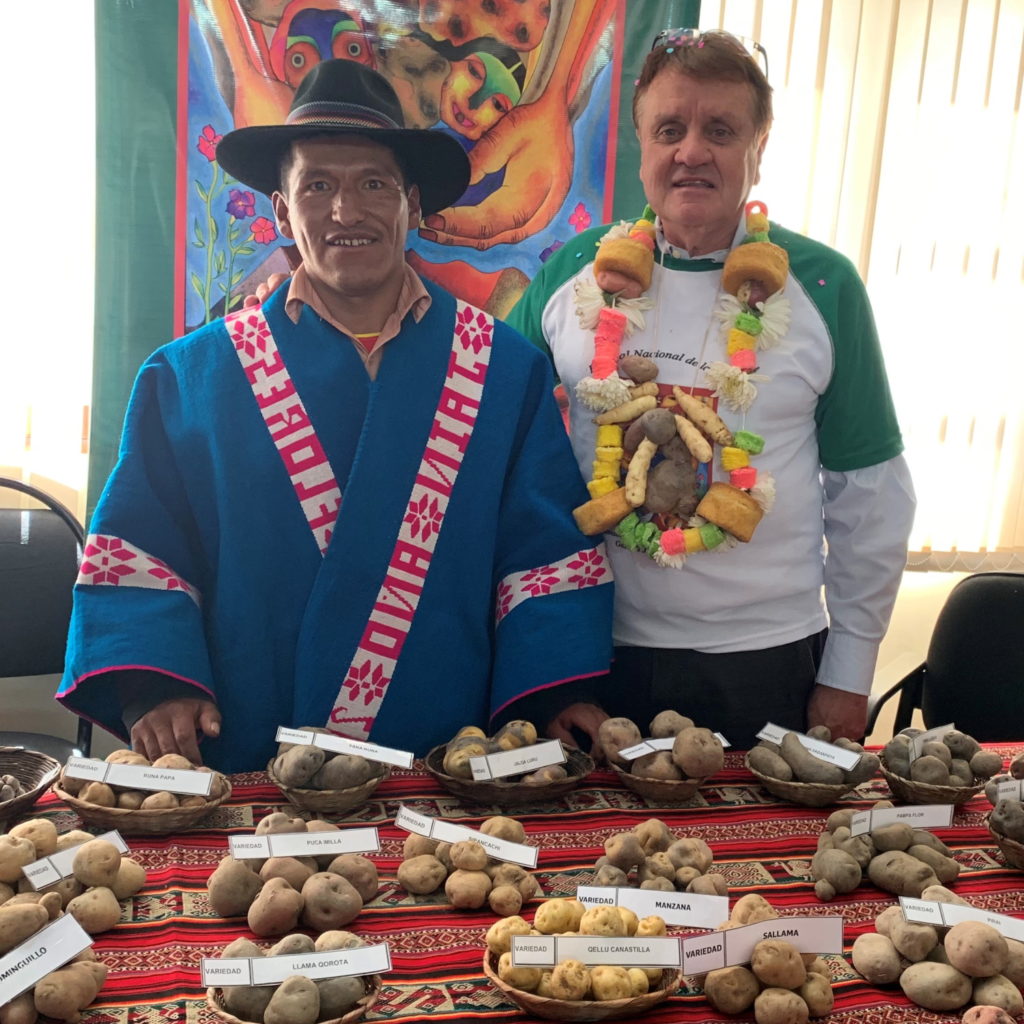The ability of the International Potato Center (CIP) to develop and deploy science-based solutions for the main challenges faced by farmers and others involved in food systems in developing countries is the result of the collective knowledge, creativity and dedication of its researchers. In recognition of the achievements of three of those researchers – Dr. David Ellis, Dr. André Devaux and Alberto Salas – CIP Director General Barbara H Wells recently named each of them a Scientist Emeritus in a ceremony attended by the CIP Board of Trustees, management and staff.
Dr. Wells dedicated a new annex of the CIP genebank that contains the herbarium and cryopreservation unit – in which plant material is frozen and conserved at -196º C – to David Ellis. She also unveiled benches with plaques commemorating the careers of André Devaux and Alberto Salas.
Though recently retired, David, Alberto, and André continue to contribute to CIP’s mission as consultants. David, who was the Head of the CIP genebank until last year, has worked closely with Alberto, a botanist who collected much of the biodiversity that the genebank safeguards. During the ceremony to celebrate their Scientist Emeritus status, David noted that Alberto is considered one of the world’s top experts in native potatoes and potato wild relatives. Whereas David and Alberto have dedicated themselves to conserving potato biodiversity, André, as CIP’s regional Director for Latin America and the Caribbean, led successful initiatives to tap the potential of that biodiversity to improve the livelihoods of smallholder Andean farmers by catalyzing new markets for the native potatoes they grown.
Each of these men has had a fascinating career and made important contributions to science and the world. The brief biographies and links to articles and videos below offer glimpses of what they’ve acheived.
David Ellis
David joined CIP late in his career, but he accomplished a remarkable amount in his six years as the genebank head and leader of CIP’s program on conserving biodiversity for the future. He applied his varied knowledge and passion for innovation to significantly enhance the genebank’s conservation of potato, sweetpotato and Andean root and tuber biodiversity, and strengthen its cooperation with other genebanks, international organizations and Andean communities.
David studied botany and forestry at the University of Montana, where he earned a PhD in botany. He was a co-founder of the research company Forest Biotechnology Centre, which among other things showed that Agrobacterium – a genus of bacteria used to transfer genes into crops – could also be used in pine species. He and his colleagues even used Agrobacterium to transfer a firefly bioluminescence protein into Douglas fir cells in an attempt to create Christmas trees with internal lights.
David was subsequently an associate scientist at the University of Wisconsin-Madison and a co-founder of the biotech company CellFor, which produced clonal conifer seedlings for reforestation. He served as a plant curator at the USDA Agricultural Research Service’s National Center for Genetic Resources Preservation in Fort Collins, Colorado – one of the world’s largest genebanks – prior to coming to CIP. While there, David helped initiate US involvement with the Svalbard Global Seed Vault, in Norway, a backup storage facility that conserves seeds from genebanks around the world.
During his six years as the head of the CIP genebank, David oversaw innovations that included the construction of a new herbarium and cryopreservation facility, and the genetic sequencing of the genebank’s entire cultivated potato and sweetpotato collections. He also helped organize and participated in the first field trips to collect potato wild relatives in Peru in two decades, under a project led by Peru’s National Institute for Agricultural Innovation.
David improved the user-friendliness of the genebank’s website, providing access to more information about the accessions it conserves, and integrated the CIP genebank into the Global Information System (GLIS), as part of a wider effort to improve compliance with the International Treaty on Plant Genetic Resources for Food and Agriculture.
At the same time, David strengthened CIP’s collaboration with organizations around the world dedicated to the preservation of plant genetic resources, including indigenous communities in the Peruvian Andes that conserve potato diversity in situ. It is hardly a surprise that the Crop Trust gave David a Crop Trust Legacy Award in 2018 in recognition of his contributions to the conservation of global crop diversity.
Learn more about David Ellis and what it takes to be a genebank manager here: https://www.genebanks.org/news-activities/news/david-ellis/
Alberto Salas
Alberto Salas has dedicated his entire career to making CIP’s collections of native potato landraces and potato wild relatives the most extensive in the world. He began contributing to those collections while studying botany at Peru’s National Agrarian University La Molina, where Professor Carlos Ochoa—one of the world’s top potato experts—recognized Alberto’s talent and hired him to collect cultivated and wild potatoes. Alberto was already an expert at spotting wild tubers in the field because he had collected them for fun during his childhood in the countryside of Ayacucho province, in the Peruvian Andes.
In 1973, the Agrarian University’s potato collection was transferred to CIP, together with the collections of other universities, to create the basis of the CIP genebank. CIP hired Professor Ochoa and Alberto to expand that collection and study its contents. Between his years at the Agrarian University and CIP, Alberto collected about 60 percent of the 2,973 potato landraces safeguarded in the CIP genebank, as well as about 60 percent of the Andean root and tuber collection and nearly all the 141 potato wild relatives held there. In the process, he discovered about 20 species of potato wild relatives.
Alberto’s more than 300 collection trips took him to remote areas of South, Central and North America in search of the potato’s wild relatives. He was stopped several times by armed groups in the mountains of Peru, he once fell from a precipice and broke his elbow, and broke his collarbone so badly when he fell from a horse that it caused permanent damaged to his neck. He also nearly drowned crossing a swollen river. Yet the specimens he collected almost always arrived at the CIP genebank in good condition.
Despite spending so much time in the field, Alberto managed to father four daughters, three of which are agronomists. His eldest daughter, Elisa Salas, is a potato breeder at CIP and the president of the Latin American Potato Association.
André Devaux
André Devaux has spent most of his life far from his native Belgium working on CIP research for development projects in Latin America, Africa and Asia. He arrived at CIP headquarters in Lima, Peru shortly after completing his Masters degree in 1978, thanks to the Food and Agriculture Organization of the United Nations (FAO) Young Professional Officers Program. Despite having done his masters thesis on maize, he quickly became a potato scientist.
In 1981, CIP hired André to help the governments of Rwanda and Burundi develop their potato breeding programs. One of the varieties that André and colleagues developed, Kinigi, remains Rwanda’s most popular potato variety today. Another variety they developed, released as Cruza 48, is also widely grown in Burundi.
From Rwanda, André transferred to Pakistan, where he spent four years leading a CIP potato project. After a sabbatical to complete his PhD in agriculture science at the Université Catholique Louvain, Belgium, André returned to South America to lead a project to build the capacity of Bolivian potato scientists. In response to the political instability that Bolivia suffered in those years, he led a process that resulted in the creation of the PROINPA Foundation, which remains active in improving potato production and smallholder incomes in Bolivia.
André’s most impactful contributions were probably his efforts to improve the livelihoods of Andean potato farmers through the development of new markets for native potatoes, which began with the Papa Andina program, from 1998 to 2009. By collaborating with an array of government and private sector partners, that program helped get colorful native potato landraces that had traditionally only been consumed in Andean communities into urban supermarkets and restaurants. It also catalyzed innovations such as native potato chips, which are now sold on several continents.
In 2007, Papa Andina won the World Challenge Award, sponsored by BBC, Newsweek and the Shell Foundation. That award process began with 900 submissions, from which Papa Andina was one of 12 shortlisted projects that the BBC produced documentaries about. When those programs aired, the BBC asked viewers to vote for the best project, and Papa Andina received the most votes.
As CIP’s regional Director for Latin America and the Caribbean, André continued the value chain work started under Papa Andina in subsequent projects, which included the promotion of good agronomic practices and nutrition education. Papa Andina also produced a Participatory Market Chain Approach that has since been used by CIP and other organizations on three continents to improve smallholder access to markets for an array of products. CIP continues to combine this approach with agronomic support to help Andean farmers improve their incomes and food security and become more climate resilient under initiatives such as an IFAD-supported project in Bolivia, Ecuador and Peru that ended earlier this year.
Though André is technically retired and now based in Belgium, he continues to support CIP’s work as a consultant and remains committed to improving the lives of farmers across the developing world.

